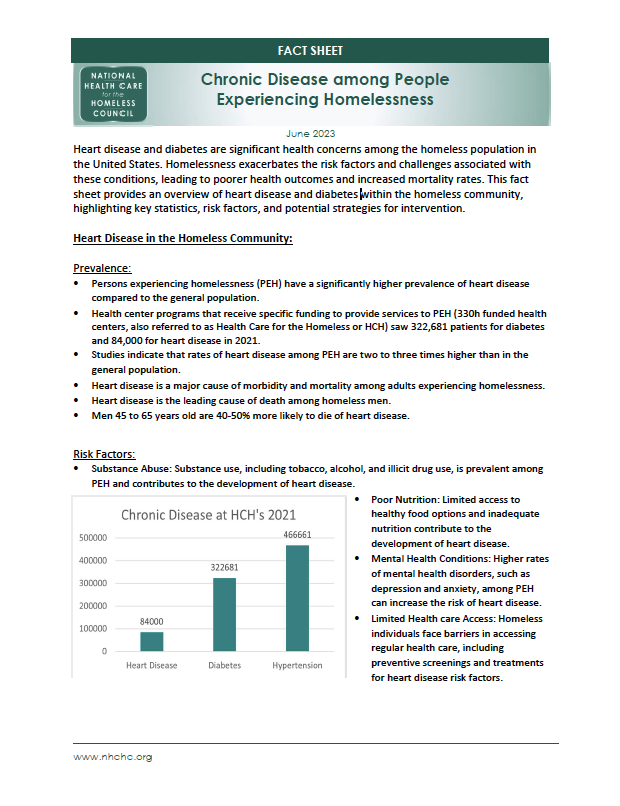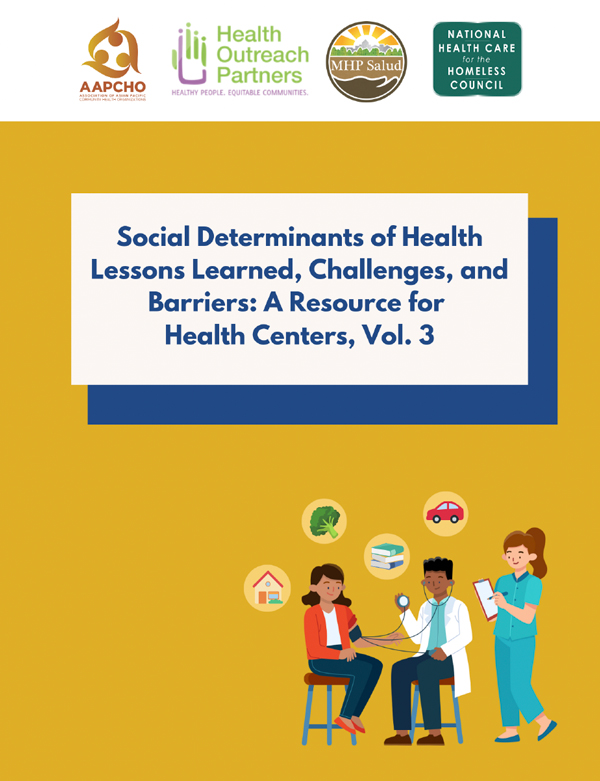Recent Publications
The National Health Care for the Homeless Council’s publications answer frequently asked questions about homelessness, medical respite care, policy, and research. Use our fact sheets with new staff and volunteers, during governing board orientations, meetings with your legislators, as part of your agency’s press kits, or with your community partners and collaborators.
2024
Using Data to Promote Health Equity
This report provides practical guidance for Health Care for the Homeless (HCH) centers by conducting a comprehensive examination of financial and operational benchmark trends, empowering HCH to leverage their data resources to effectively address health equity concerns.
2023
COVID-19 Data Fact Sheet: April 2020 – March 2023
This fact sheet aims to illuminate key aspects of the impact of COVID-19 on individuals experiencing homelessness, offering insights into testing statistics, vaccination efforts, and the broader implications on public health. By understanding the specific challenges faced by this population, we can better inform targeted interventions and support systems to mitigate the impact of the pandemic and work toward a more inclusive and resilient community response.

Rebuilding Systems: Adapting Housing Assessments to Prioritize Health, Equity, and Belonging
The need for housing prioritization results from a lack of affordable housing. Existing tools have been applied universally and have resulted in further inequity. This toolkit is intended to help communities create a process that centers equity and community-specific needs.
Heart Disease Fact Sheet
Heart disease and diabetes are significant health concerns among the homeless population in the United States. Homelessness exacerbates the risk factors and challenges associated with these conditions, leading to poorer health outcomes and increased mortality rates. This fact sheet provides an overview of heart disease and diabetes within the homeless community, highlighting key statistics, risk factors, and potential strategies for intervention.
Social Determinants of Health Lessons Learned, Challenges, and Barriers: A Resource for Health Centers, Vol. 3
The National Health Care for the Homeless Council, the Association of Asian Pacific Community Health Organizations (AAPCHO), Health Outreach Partners (HOP), and MHP Salud, four HRSA-funded National Training and Technical Assistance Partners (NTTAP) organizations, released a report on lessons learned, challenges, barriers, and impact stories shared from the (4) sessions of the “Acting on SDOH Screening Data to Address Barriers to Health” Learning Collaborative. This Learning Collaborative shared strategies to respond to SDOH data through enabling services staff, culturally and socially appropriate interventions, and internal and external organizational capacity.
2022
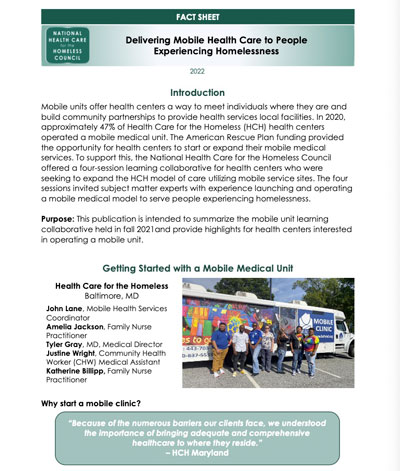
Delivering Mobile Health Care to People Experiencing Homelessness | October 2022
Mobile units offer health centers a way to meet individuals where they are and build community partnerships to provide health services local facilities. In 2020, approximately 47% of Health Care for the Homeless (HCH) health centers operated a mobile medical unit. The American Rescue Plan funding provided the opportunity for health centers to start or expand their mobile medical services. This publication is intended to summarize the mobile unit learning collaborative held in fall 2021and provide highlights for health centers interested in operating a mobile unit.
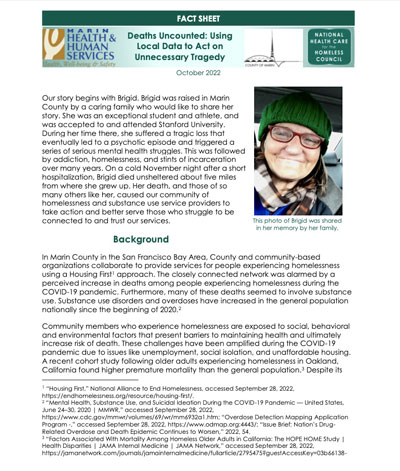
Deaths Uncounted: Using Local Data to Act on Unnecessary Tragedy | October 2022
In Marin County in the San Francisco Bay Area, County and community-based organizations collaborate to provide services for people experiencing homelessness using a Housing First approach. The closely connected network was alarmed by a perceived increase in deaths among people experiencing homelessness during the COVID-19 pandemic; many of these deaths seemed to involve substance use. This publication details their work to find mortality rates and causes of death among people experiencing homelessness and compare the data with the county’s general population by using a person-matching method.
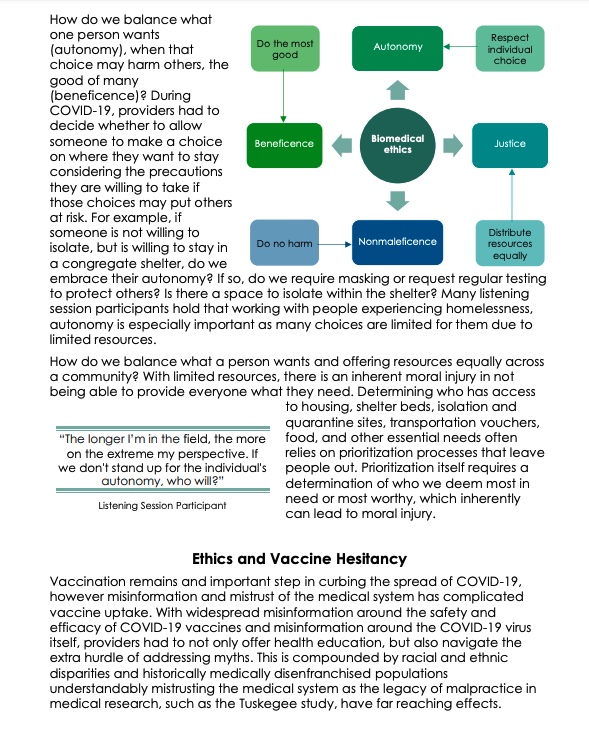
Medical Ethics and COVID-19: Naming and Addressing the Moral Injury of Care during COVID-19 | July 2022
Working within the context of Health Care for the Homeless (HCH) means that providers and staff regularly navigate complex needs and systems to best care for the people they serve. A key piece of this is ensuring the dignity of the people experiencing homelessness. Providers seek to offer high-quality care, meeting people where they are, but often face the tensions that come from balancing limited resources, negative experiences individuals had within systems, and what is considered the best treatment plan. The purpose of this document is to summarize ethical challenges providers have faced during COVID-19 and share strategies to address moral injury stemming from difficult ethical decisions.
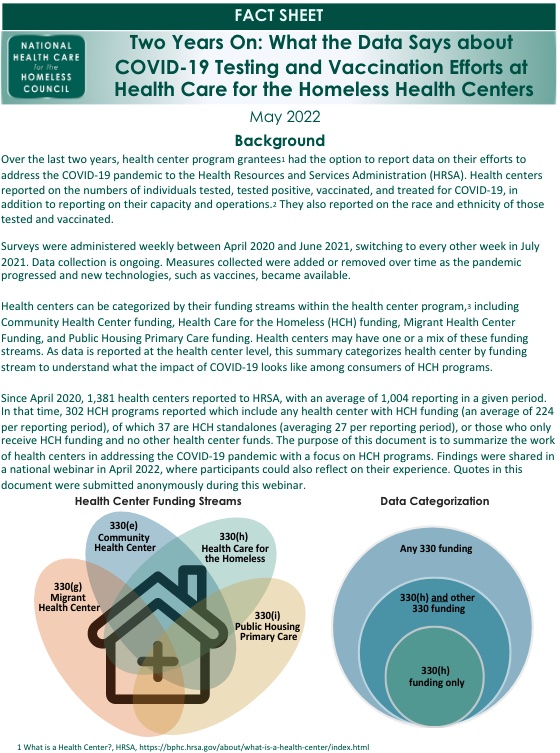
Two Years On: What the Data Says About COVID-19 Testing and Vaccination Efforts at Health Care for the Homeless Health Centers | June 2022
Over the last two years, health center program grantees had the option to report data on their efforts to address the COVID-19 pandemic to the Health Resources and Services Administration (HRSA). Health centers reported on the numbers of individuals tested, tested positive, vaccinated, and treated for COVID-19, in addition to reporting on their capacity and operations. The purpose of this document is to summarize the work of health centers in addressing the COVID-19 pandemic with a focus on HCH programs.
2021

A Review of the Council’s 2020-2021 Research and Resources (2020-2021)
The National Health Care for the Homeless Council staff members have been committed for decades to creating and developing resources to address the intersecting issues of homelessness and health care. In 2020, the coronavirus pandemic brought challenges unlike any ever faced. People experiencing homelessness have been particularly vulnerable during the COVID-19 pandemic, and the Council moved quickly to create resources and collect guidance to help meet their needs.
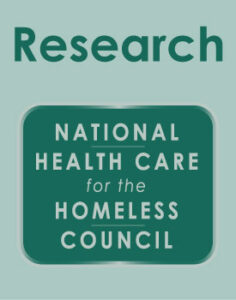
Health Care for the Homeless Health Centers during the COVID-19 Pandemic | July 2021
Since April 2020, the Health Resources and Services Administration (HRSA) and health centers have been reporting their testing, positivity and antibody rates along with other key factors such as telehealth usage, staff positivity rates, health centers that have closed, and other areas. More recently, as of January 8, 2021, health centers began reporting vaccinations. This fact sheet is to demonstrate the resiliency of health centers and to highlight access to care based on demographical populations in relation to COVID-19.

Community Health Worker/Peer Workforce Recruiting and Hiring for Social Determinants of Health Screening | June 2021
This is a best practices guide for health centers considering or evaluating a community health worker or peer workforce program in their health center to assist with SDOH screening. This publication focuses on how to integrate this workforce into clinic workflow and care teams. Both providers and community health workers were interviewed to share their experiences and facilitators in hiring, training, and integration into the health center environment. We also explored how this workforce’s role has evolved during the COVID-19 pandemic. This publication was in collaboration with CSH and MHP Salud.

Oral Health and Behavioral Health in Patients Experiencing Homelessness | June 2021
This publication brings awareness to the intersection of oral and behavioral health among patients experiencing homelessness. We explore the prevelance and relationship between oral and behavioral health and the impacts they have on each other. The publication provides considerations for how mental health and oral health providers can work together to provide integrated whole person care. This was a collaborative publication with are partners at the National Network for Oral Health Access (NNOHA).
2020

Community Information Exchange: Using Data to Coordinate Care for People Experiencing Homelessness | April 2020
As health centers continue to build innovative models to serve people experiencing homelessness, partnerships to address the social determinants of health become more crucial. A major challenge organizations face in building and sustaining these partnerships is communication and sharing relevant information to ensure coordinated care. This publication highlights what CIEs are, how they can be used, and how this could be beneficial during health care crises like COVID-19.
2019

Intersections on Homelessness and Human Trafficking: A Case Study on End Slavery Tennessee | December 2019
There is a lack of knowledge regarding how pervasive trafficking is in the United States and what it looks like across the country. The clear intersection of people experiencing homelessness and trafficking makes this a logical area for Health Care for the Homeless providers to engage. This case study, highlighting the work of End Slavery Tennessee provides an example of quality services for individuals with the experience of both homelessness and human trafficking, and shares signs providers can use to identify a history of trafficking and additional health considerations.

Pre-Exposure Prophylaxis (PrEP) for HIV Prevention: Considerations for Individuals Experiencing Homelessness | September 2019
Despite major advancements in HIV testing, treatment, and prevention, HIV diagnoses in the United States have remained stable since 2013. This fact sheet explores the intersection of HIV and homelessness, focusing on subpopulations with disproportionate rates of infection. It also provides promising practices in prevention and treatment, including recommendations around the initiation of PrEP in the Health Care for the Homeless setting.

Oral Health and Diabetes in Patients Experiencing Homelessness | May 2019
This publication with the National Network for Oral Health Access examines the connections between periodontal disease, diabetes, and homelessness. The limited access to health care experienced by people without homes creates poor health outcomes and a lack of preventive care for chronic conditions, including diabetes and periodontal disease. Learn the answers to frequently asked questions related to this care for individuals experiencing homelessness in the fact sheet and watch our archived webinar, “Oral Health and Diabetes for Patients Experiencing Homelessness.”

Homelessness & Adverse Childhood Experiences: The Health and Behavioral Health Consequences of Childhood Trauma | February 2019
Childhood trauma has lasting impacts on health outcomes and development. This fact sheet explores the impact of Adverse Childhood Experiences and provides screening and treatment options. This resource was developed in partnership with the National Network to End Family Homelessness, an initiative of The Bassuk Center on Homelessness and Vulnerable Children and Youth.

Homelessness & Health: What’s the Connection? | February 2019
Homelessness can take many forms, with people living on the streets, in encampments or shelters, in transitional housing programs, or doubled up with family and friends. While the federal government reports 1.5 million people a year experience homelessness, other estimates find up to twice this number of people are actually without housing in any given year. The connection between housing and homelessness is generally intuitive, but the strong link between health and homelessness is often overlooked. This fact sheet outlines how health and homelessness are intertwined—and why housing is health care.
2018

2016 Uniform Data System Summary: Profile of HCH Grantees | October 2018
The Uniform Data System (UDS) is a central repository for standardized health data from health centers funded under Section 330 of the Public Health Service Act. Our new report summarizes how the National HCH Council has utilized 2016 UDS data to provide technical assistance (TA) to 330(h) grantees and lookalikes to establish benchmarks, identify needs and prioritize new programs, demonstrate the value and impact of grantees and the overall HCH program, and facilitate the delivery of targeted training and TA.

Suicide and Homelessness: Data Trends in Suicide and Mental Health Among Homeless Populations | May 2018
Given the conditions that we know increase the likelihood of suicide in the general population, compounding factors faced when experiencing homelessness place those without homes at much higher risk. This fact sheet details common risk factors for suicidal behaviors, mental health and clinical utilization trends of HCH grantees reported in the 2016 Uniform Data System dataset, and circumstantial data reported in the National Violent Death Reporting System.
2017

Demonstrating Value: Measuring the Impact of the Health Care for the Homeless Grantees | August 2017
Alaina Boyer, National Health Care for the Homeless Council
Demonstrating the value of health centers is a necessary element of sustainability and measuring benefit. To help illustrate that value, this document provides an overview of the complex challenges facing homeless populations, the history of Health Care for the Homeless, and the critical impact of the work of HCH programs.

Addressing the Opioid Epidemic: How the Opioid Crisis Affects Homeless Populations | August 2017
Brett Poe and Alaina Boyer, National Health Care for the Homeless Council
This fact sheet examines how the opioid crisis affects people without homes. America is facing an opioid crisis, and that epidemic has significantly impacted people without homes. Homeless populations have higher rates of substance use disorders, poorer health, and higher mortality rates by opioid overdose than national averages. Our publication examines the social determinants of health that contribute to that increased prevalence and morbidity. It also details the systemic barriers that hinder access to care and success in recovery for people without homes, as well as best practices to address those barriers. Read the fact sheet.



